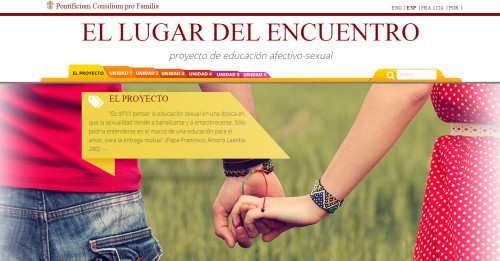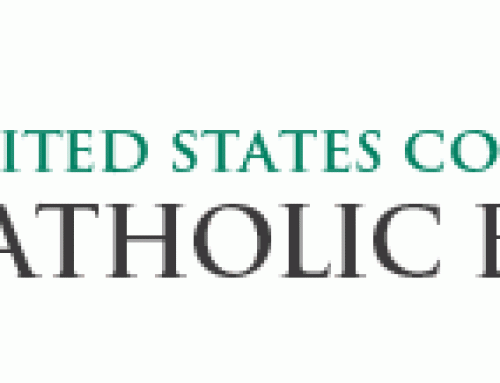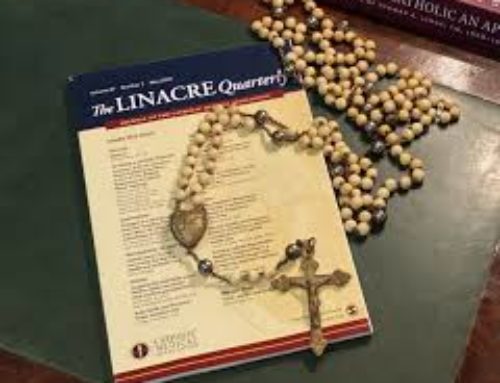http://www.educazioneaffettiva.org/ (English, Español, Français, Italiano, Portugués)
Prologue by Msgr. Mario Iceta
The vocation to love is both a gift and a task that God has given to us. It is a place to live, to recognize one another, to establish one’s life; and it is, at the same time, a task to complete, a dwelling place to build with others, the finality of which is communion with God and with our neighbor.
The person and love are two profoundly connected realities. They mutually make reference to each other. We are persons, image of God, called to the interpersonal communion that is realized in love. Just as God is love as a communion of Persons, his way of being remains imprinted in human reality: “Let us make human beings in our image, after our likeness. Male and female he created them.” The dual unity of man and woman is the humanized expression of God: man and woman, called to form a unity of life in love, which is the icon of the Trinity.
Since the vocation to love is an immense gift and task, we need to understand this logic of the gift and make it our own. We need to not only understand it, but must also learn to love. After the logic of the gift comes the grammar of the gift. We need to learn its hidden details and attitudes, to develop our capacities, to order our existence, to acquire virtues…in order to build up and attain the promise of communion that the experience of love allows us to glimpse.
This is the task that we must begin from the earliest stages of life. A child perceives that he is loved, and this reassures his personality, his abilities and his confidence in the future. He quickly realizes that this love also poses a question to him, that it demands a response, and he progressively learns to love. The experience of the family is particularly decisive in the earliest moments of our life. Adolescence marks a time to discover corporality and sexuality in a new way, as the language of love. It constitutes an especially delicate period. Without reference to the vocation to love, sexuality remains unintelligible. How we understand and personalize our affections, inclinations, passions, desires, and all of the dimensions of the perception of our sexed bodies requires a delicate work of apprenticeship. The integration of the bodily dimension into the personal call to fulfill our vocation to love is a decisive task for the future experience of our own personal vocation.
During youth, this task of affective-sexual education enables us to love in a true and human way, open to an even deeper communion, which is communion with God. It establishes the personal qualities that will allow us to have this experience of love, laying the foundations of the reality of the life of the person, as a motor driving the edification of a full, great life that is capable of building true relationships by making the love of God present in flesh and in humanity.
To this end, years ago, the Subcommittee of the Family and the Defense of Life of the Spanish Episcopal Conference began the preparation of these units of affective-sexual education, in order to help adolescents and youth understand the logic of the love which enshrines itself in them, and to develop the capacities, abilities, competencies, habits, and virtues that constitute the grammar of love, so that they may attain the beauty and goodness of the vocation to love that is inscribed in their hearts. Many experts have collaborated on this project, and we are grateful for the generosity, expertise and experience that they have placed at the service of this work.
Since the family is the natural ethos where we learn to love, it is precisely to families that we wish to offer this project. We have sought to help them, to place at their service a tool which might permit them to carry out the precious task of teaching their children so as to enable them to fully live out their vocation to love in its diverse forms, according to the plan that God has reserved for each one of them: in future families, in consecrated life, in priestly ministry, in contemplative life, in the offering of themselves as missionaries…
Additionally, we are conscious of the fact that families are assisted by the school and by the parish community in this educative task. For this reason, this work is organized in six didactic units adapted to the curricular plan of religion classes in the ESO (Spain), so that it may be introduced into the corresponding curricular dynamic. This material may also be employed in different ways in parish catechesis, faith education for adolescents and youth, preparation for the reception of the sacrament of confirmation, etc.
For this reason, collaboration with the Episcopal Committee for Teaching and the Episcopal Subcommittee for Catechesis, in addition to the approval on the part of the Episcopal Committee for the Doctrine of the Faith, have been especially relevant in providing versatile material that may be used in diverse ways, within distinct sectors of education and formation.
Finally, the bishops of the Episcopal Subcommittee for the Family and the Defense of Life would like to express our gratitude for the interest, encouragement and reception on the part of the Pontifical Council for the Family. We would like to offer this material to the whole Church on the occasion of the World Meeting of Families 2015. We have presented it in a digital format, conscious of the fact that, today, teaching is principally carried out through technological means. Our adolescents and youth are native to the digital age, and we, too, have desired to be present in this space where they live. Additionally, making this material available online, greatly facilitates its timely availability and financial accessibility in different countries and continents.
We entrust this material to the protection of the Holy Family. Jesus, Mary and Joseph constitute the model of the human family. In them we contemplate God incarnate, that divine Love that sustains human love and brings it to perfection. May the Holy Family protect all families, especially those experiencing difficulties. May the exquisite dedication with which Mary and Joseph provided Jesus with human formation and molded his heart, be for us the grace that helps us to mold the hearts of our adolescents and youth after the Sacred Heart, meek, humble, totally entrusted to Jesus. With much affection.
+ Mario Iceta Gavicagogeascoa
Bishop of Bilbao and President of the Subcommittee for the Family and the Defense of Life of the Spanish Episcopal Conference.
http://www.educazioneaffettiva.org/ (English, Español, Français, Italiano, Portugués)









